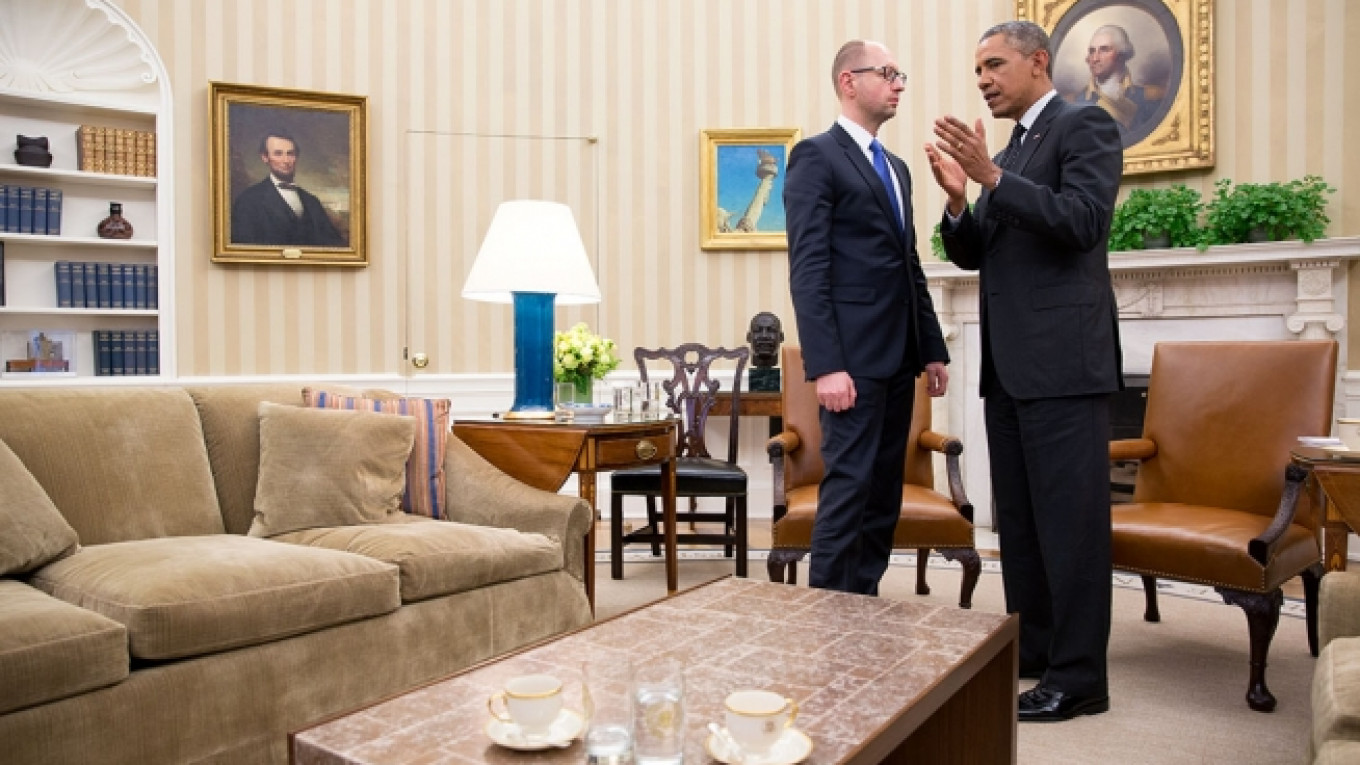The White House has thrown some light on who may be next in line to feel U.S. wrath over Crimea's breakaway from Ukraine: businesspeople close to the Russian government.
White House spokesman Jay Carney said the U.S. will add bite to its current sanctions against Russian government officials by targeting the business community loyal to the political elite.
President Barack Obama's recent executive order seeking to make Moscow pay a price for pulling Crimea away from Ukraine opened the way for sanctions against individuals who provide material support to members of the Russian government.
"I think anyone who understands how the Russian system of governance works and who has influence in that system understands the kind of person that we are talking about here, and the fact that they have substantial assets, not just in Russia, but abroad," Carney said at a news conference Tuesday.
Carney spoke after reporters in the press room pointed out the rise of the Russian stock market earlier that day in defiance of the “risible” sanctions that are now in place against seven senior government members in Moscow.
“I would not, if I were you, invest in Russian equities right now,” he said.
Carney did not say when the U.S. might announce which new names would be hit with punitive measures, such as visa restrictions and asset freezes.
The businesspeople on the list are likely to be those that benefit from government contracts, said Tatyana Stanovaya, a France-based analyst for Moscow's Center for Political Technologies.
They are, as a rule, the ones that had the benefit of knowing President Vladimir Putin from the days before he moved to Moscow from St. Petersburg, she said. These individuals either served with Putin in the KGB — the Soviet secret service — or lived next door to his countryside home in the Ozero community outside of St. Petersburg or otherwise had been on good terms with him at that time, she said.
Stanovaya declined to name the business owners, but said they were “affluent” and that some of them had foreign citizenship.
The list could include Igor Sechin, chief of the world's biggest publicly traded oil producer Rosneft; Gennady Timchenko, a Finnish citizen and co-founder of oil trader Gunvor, with interests also in the construction industry; Arkady Rotenberg, with stakes in a bank and contractors of Gazprom and the Moscow metro; and Yury Kovalchuk, an owner of banking and media assets.
Sechin has already ridiculed the threat of such sanctions.
“Threats, blackmail and nasty tricks against individuals are testimony of powerlessness, which is humiliating to any countries that respect themselves,” he said Tuesday, PRIME reported. “With regards to an elite that is loyal to its country, always and everywhere sanctions brought about a consolidation and a concentration of forces to counteract pressure from the outside.”
He also pointed to Cuba, which has long lived under a U.S. embargo.
Sechin appeared so confident of his future and the future of Rosneft that he acquired 1 billion rubles ($27 million) worth of Rosneft shares as their value declined on Crimea-related jitters, Interfax reported Wednesday.
Rotenberg, a former judo partner of Putin's, ranked as last year's top state contractor in the March edition of Forbes' Russian edition, raking in revenues of 184 billion rubles.
Stanovaya said any future firing of shots at the Kremlin's business entourage would sting, but not stop Putin in his tracks.
“Those who profit from doing business with the state realize that it is more advantageous and pragmatic to maintain relations with Putin than try to talk him into backpedalling [in his confrontation with the West over Crimea],” she said.
Andrei Shenk, an analyst at brokerage InvestCafe, said Carney's warning against buying Russian stocks was unlikely to provoke a sell-off on the stock exchange.
The State Duma, meanwhile, brushed off the existing sanctions, which affect some of its ranks, issuing a statement to ask the U.S. to include the entire lower chamber of the parliament, 450 lawmakers, as targets.
At the same time, Foreign Minister Sergei Lavrov has warned the U.S. that a slapping of further restrictions on Russia would call for reciprocal measures.
A Message from The Moscow Times:
Dear readers,
We are facing unprecedented challenges. Russia's Prosecutor General's Office has designated The Moscow Times as an "undesirable" organization, criminalizing our work and putting our staff at risk of prosecution. This follows our earlier unjust labeling as a "foreign agent."
These actions are direct attempts to silence independent journalism in Russia. The authorities claim our work "discredits the decisions of the Russian leadership." We see things differently: we strive to provide accurate, unbiased reporting on Russia.
We, the journalists of The Moscow Times, refuse to be silenced. But to continue our work, we need your help.
Your support, no matter how small, makes a world of difference. If you can, please support us monthly starting from just $2. It's quick to set up, and every contribution makes a significant impact.
By supporting The Moscow Times, you're defending open, independent journalism in the face of repression. Thank you for standing with us.
Remind me later.






